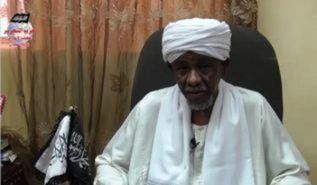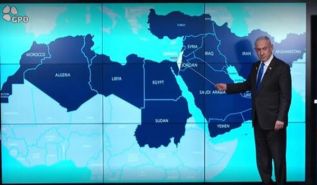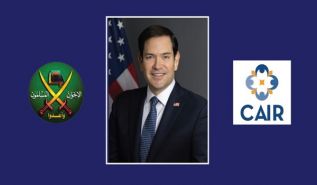بسم الله الرحمن الرحيم
News Right Now: Shifting Sands
There is a crisis in Jordan that has led to the explosion of the current wave of anger, but the most important element is that these same conditions exist in more than one place in the region, especially in Egypt and Tunisia, which are suffering from the same economic crises, and also suffer from high unemployment, poverty, indebtedness and high prices, which means that more than one country in the Arab region is a candidate for new tensions and protests. In Egypt, public debt has tripled over the past ten years, and by March 2022, it had reached $155.7bn - an increase of $23bn in just one year. The Egyptian pound suffered further depreciation, which has led to a "price frenzy" and an increase in poverty rates as people's purchasing power is eroded.
Tunisia does not look any better off with the deterioration of its economic data, whether related to unemployment, high costs, rising poverty or public debt, which has increased the state of grumbling and criticism despite the regime's attempt to tighten control and its grip on security. The bottom line is that what is happening in Jordan may not be a passing wave of protest, but rather a prelude to a wave of anger that may sweep the region. It may yet expand to a second wave of the "Arab Spring" that began in Tunisia in early 2011, displaying a widespread popular desire in the Arab world for change.
Protests in Jordan have resumed due to the increase of gas prices. The fuel prices have increased by 25% even though the rest of the world decreased oil prices by 30%. The latest wave of protests started with truck drives, when they went on strike because they said these prices of gas affect their income. Then public transporters joined the strike because it has affected them as well. This set a wave of protests, for the citizens of Jordan who have had enough. Eventually, these protests turned into riots. This is not the first time that protests have emerged in Jordan. Over the last 30 years or so, many of the protests have been rooted in grievances triggered by economic crises and accompanying austerity measures.
At the height of the tension a A senior police officer was mysteriously shot in the head. “We will strike with an iron fist anyone who tries to attack lives and property," said by the police. Then, later, a long convoy of armored vehicles was seen entering Maan as reinforcements were sent to the neighborhood where the police officer was killed, during that time, 3 other policemen were killed. Meanwhile, in Zarqa, police and the youth have clashed. Police have also fired teargas in Jabal al Abyad against protesters and in Tafiyla the police chased the protesters who were chanting anti-government slogans. Also, the youth has clashed with police in Irbid. The Arab Spring in Jordan has begun to fuel up due to the manipulation of the Jordanian government, and the government is trying to maneuver its way to avoid it.
Jordanian analyst Osama al-Sharif said that Jordan needs to borrow $2.8 billion every year, which creates a deficit and increases the national debt. And on top of all that, Jordan is publicly at about $47mb in debt, constituting 106% of GDP. So that causes higher prices on taxes so that they pay it off even though the poverty rate in the country is skyrocketing.
Jordan has the capability to relieve the burden of its citizens from the rising prices of their commodities, gas, electricity, water, bread, etc. However, it's a puppet regime that was implanted in order to serve western interests. The establishment of Jordan was commensurate with its role in recognizing the Jewish entity and concluding security and economic agreements with it to increase its empowerment under the pretext of its extreme poverty, and it is the one who was established to be also isolated from its Islamic roots, and to be at the mercy of aid, grants, usurious loans, and the burden of the International Monetary Fund and American aid, so that the regime’s continuous argument is to mortgage its political decision to the colonial Kafir, despite the buried wealth that Allah has bestowed upon the country. The political system in Jordan goes through recurring internal crises from time to time.
It deals with these crises with immediate, partial solutions from within the reality and the circumstances that created them, and when solving each problem, it seeks to stabilize its rule and not solve the problems of the people. When matters become tough, it does not harm the regime to overthrow the government and appoint another. However, the people of Jordan are now more than ever aware of the regime and its tactics and the blinds have been removed, possibly once and for all.
Protests have crossed almost all of Jordan’s usual social divides. What some may have seen initially as a middle-class tax revolt was actually much more. It had begun with a one-day work stoppage by Jordan’s professional and trade unions. But even the organizers themselves were surprised by the scale of participation, which was far larger than the membership of the parties, professional associations, trade unions, and the Hirak combined. The 2018 protests included Jordanians from all walks of life, crossing economic and social classes and including Jordanians of both Palestinian and East Jordanian origins, Muslims and Christians, and Arabs, Circassians, and Chechens.
Another alarming issue for some in the regime was the fact that these movements, just like the massive 1989 protests, began in the south, in the very communities that allegedly used to be the “bedrock support” for the Hashemite state. The Hirak protesters, in short, often emerged from the same communities from which the state routinely recruits for its own police, military, security forces, and intelligence services. They are aware that the current suffering, hardship, humiliation and the plundering of resources, is a continuation of what the Kafir colonizer started. And it’s no secret Muslim lands are blessed with wealth but are intentionally weakened by these colonial regimes.
The root of the problem is that Jordan, which is part of the Islamic Ummah, as are all the states of Sykes-Picot, was separated from its mother country, that is, the Islamic state, at the moment of its weakness and fall, to which it belongs ideologically, and links it with the peoples of neighbouring countries by the bond of the Islamic ideology without regard for any borders, and the solution to its problems and its crises will be with its return, and all of the countries of Ash-Shaam, to be part of the entity of the Khilafah State, so it will be a part of it and it is a part of it, so it emerges from the oppression of the rulers, their domination, their corruption, and their subordination to colonialism to the justice and application of Islam.
So all its crises will be resolved, and its people will enjoy honour, dignity and justice, and indeed all Muslims will enjoy wealth and public property in their countries, instead of plundering it from America and Europe, and instead of relying on the aid of the enemy America and malicious Britain, and it will stand with pride and dignity against the enemy the Jewish entity instead of agreements of shame and humiliation. The course of events and situations that people witness from helpless solutions are only occasional solutions that exacerbate crises and prolong the solution that Allah wanted for this Ummah, then it does not become triumph except with its giving support to Allah the Almighty.
(يَا أَيُّهَا الَّذِينَ آمَنُوا إِن تَنصُرُوا اللَّهَ يَنصُرْكُمْ وَيُثَبِّتْ أَقْدَامَكُمْ)
“O believers! If you stand up for Allah, He will help you and make your steps firm.” [TMQ Muhammed:7]
Ummah Voice Podcast
SoundCloud Link: Click Here




